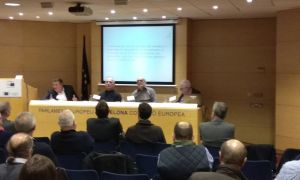On Monday, November 27, the Catalunya Europa Foundation presented the results of the project "Professional Training and Mobility: Improving Job Opportunities", which has the support of the European Commission.
The conclusions presented are the result of 3 seminars that have been carried out with the parties involved, in order to express the shortcomings, challenges and opportunities that each group finds. Among the attendees to the meetings were Professional Training centers with their directors and technicians in mobility, companies and unions, and representatives of the public and local administration, and related institutions in the field of education and work. A group of young people has also participated in all the meetings to also express their point of view.
As a result of these meetings, the foundation has prepared a report that was presented to the Aula Europa this past Monday with the welcome of Mr. Ferran Tarradellas, Head of the European Commission Office in Barcelona, ??Mr. Ernest Maragall, President of the Foundation, Mr. Xavier Farriols and Francesc Colomé, authors of the report and Mr. Oriol Homs, Founding Partner of NOTUS.
In this report we find that mobility in VET is still minority, especially if we compare it with mobility in the university world. The different seminars have allowed to conclude some difficulties that arise.
First of all, mobility at VET requires at least the articulation of three subjects: the student, the company and the center. To this triple agreement the shortest duration of the studies (in relation to the university studies), the socio-economic origins of the young people and the linguistic difficulties must be added. In addition, there is also a break between centers. While there is a minority of centers (in increase) that clearly opt for mobility in vocational training, there are still most those who do not show an interest in participating in these programs.
This fracture is also present in companies, while multinationals and large companies have more facilities to accommodate students in mobility, small companies have lower rates of student acceptance. This fact also hinders the mobility possibilities of the local students, since the exchange programs entail reciprocity between the different participating centers.
Another key element is the students' own interest. Also at this point there is a break between those who see in the mobility a useful competition and those who do not. Often social factors make young people need to integrate immediately into the workplace or do not consider extending academic training with international practices to bring them added value. In this sense, mobility aids are essential to overcome this obstacle.
For his part, Oriol Homs emphasized the importance of developing a protocol to follow so that the stay of internships abroad is the most beneficial for the student. He also added that it is important for companies to value more mobility for future professionals.
The event was framed in the European Week of the FP (European Vocational Skills Week) which was held in Brussels from November 20 to 26, 2017.
You can consult the report in the attached document.










